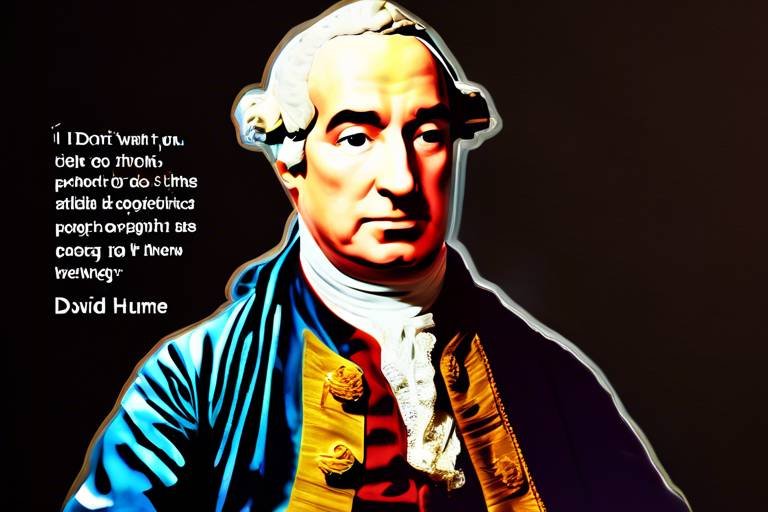The Thought of David Hume - A Philosophical Review
In the realm of philosophy, few figures shine as brightly as David Hume. Born in 1711, this Scottish philosopher, historian, and economist left an indelible mark on the intellectual landscape of the Enlightenment. His thoughts, particularly in the areas of empiricism, skepticism, and ethics, continue to resonate with scholars and thinkers today. Hume's philosophy is not just a collection of ideas; it’s a vibrant dialogue that challenges us to reconsider how we understand knowledge, morality, and the very nature of reality. So, what exactly did Hume contribute to modern thought, and why should we care?
At the heart of Hume's philosophy is his unwavering belief in the importance of experience and observation. Unlike rationalists who sought knowledge through reason alone, Hume argued that our understanding of the world is fundamentally rooted in our sensory experiences. This perspective not only challenges the rationalist viewpoint but also lays the groundwork for the scientific method as we know it today. Imagine trying to navigate a new city without ever stepping outside; Hume suggests that just as we rely on our senses to explore the physical world, we must also depend on them to grasp the complexities of knowledge itself.
Hume's skepticism extends into the realm of causation, where he famously questioned the very foundation of our understanding of cause and effect. He posited that we cannot directly observe causation; rather, we infer it from patterns we see in our experiences. This leads us to the problem of induction, a central theme in Hume's work, which challenges the validity of inductive reasoning. If we can’t guarantee that the future will mirror the past, how can we justify our scientific conclusions? This line of questioning is not just philosophical fluff; it has profound implications for how we conduct scientific inquiry and build our understanding of the universe.
Hume's empiricist approach reshapes our understanding of knowledge and cognition. He believed that all human knowledge arises from sensation and reflection. This leads us to consider a key distinction he made: the difference between relations of ideas and matters of fact. Relations of ideas are akin to mathematical truths, while matters of fact are contingent upon the world around us. This distinction, often referred to as Hume's Fork, serves as a critical tool in epistemology and metaphysics, allowing us to navigate complex philosophical discussions about what we can truly know.
As we delve deeper into Hume's skepticism, we encounter his radical views on causation. He argued that our belief in cause and effect is not a product of rational deduction but rather a habit formed by the repeated observation of events. For instance, when we see a ball strike another and then observe the second ball move, we instinctively conclude that the first caused the second to move. But what if that connection is merely a product of our conditioning? Hume's challenge forces us to rethink our assumptions about the world and the mechanisms we use to understand it.
The problem of induction is a cornerstone of Hume's skepticism. It raises critical questions about how we justify our beliefs based on past experiences. If every time we drop a ball it falls, does that mean it will always fall? Hume's critique suggests that we cannot assume that the future will always resemble the past. This realization has far-reaching implications, not only for philosophy but also for scientific practice. If scientists cannot rely on induction, then how do they formulate theories? Hume's insights compel us to acknowledge the limitations of our reasoning processes.
Hume's Fork further clarifies his epistemological stance by emphasizing the distinction between analytic and synthentic judgments. This division is crucial for understanding the limits of human knowledge. Analytic statements are true by virtue of their meaning, while synthetic statements require empirical verification. This framework invites us to scrutinize the very foundations of our beliefs and the methods we use to acquire knowledge.
Hume's contributions to the scientific method cannot be overstated. His skepticism about causation and induction paved the way for a more rigorous approach to scientific inquiry. By emphasizing the importance of observation and experience, Hume laid the groundwork for methodologies that prioritize empirical evidence. This shift has not only influenced the natural sciences but also extended to the social sciences, where the need for empirical validation remains paramount.
Turning to ethics, Hume's framework is grounded in human emotions and sentiments rather than in rational deduction. He famously asserted that reason is the slave of the passions, suggesting that our moral decisions are largely driven by feelings rather than abstract principles. This perspective challenges traditional moral philosophy and invites us to consider how our emotional responses shape our ethical views. In a world where moral dilemmas abound, Hume's insights remind us that our humanity is intricately tied to our capacity for empathy and emotional understanding.
Hume's thoughts have profoundly influenced subsequent philosophers, setting the stage for modern philosophical discourse. His skepticism and empiricism prompted significant responses from later thinkers, notably Immanuel Kant, who sought to address the challenges posed by Hume's ideas. Kant's critical philosophy emerged as a direct response to Hume's skepticism, marking a pivotal moment in the history of philosophy.
Kant's engagement with Hume's skepticism led him to develop his own theories regarding knowledge and morality. Kant argued that while our knowledge begins with experience, it is shaped by the structures of our mind. This synthesis of empiricism and rationalism represents a turning point in philosophical thought, demonstrating the lasting impact of Hume's ideas.
Even today, Hume's philosophical inquiries remain relevant. His thoughts on empiricism and ethics continue to resonate in contemporary debates within philosophy and the social sciences. As we grapple with issues of knowledge, morality, and the nature of reality, Hume's insights serve as a guiding light, challenging us to think critically about the foundations of our beliefs.
- Who was David Hume?
David Hume was an 18th-century Scottish philosopher known for his contributions to empiricism, skepticism, and ethics. - What is Hume's Fork?
Hume's Fork is a distinction between relations of ideas (analytic truths) and matters of fact (empirical truths). - How did Hume influence modern philosophy?
Hume's skepticism and empiricism influenced many philosophers, including Kant, and continue to shape contemporary philosophical discussions.

Empiricism and Knowledge
David Hume's approach to knowledge is nothing short of revolutionary. He boldly asserted that experience and observation are the cornerstones of human understanding. Unlike rationalists who believed in innate ideas and reason as the primary sources of knowledge, Hume proposed that our understanding of the world is built through our interactions and experiences. This shift in perspective challenges us to reconsider how we acquire knowledge and what we deem as true.
At the heart of Hume's empiricism lies the idea that all knowledge originates from sensory experiences. He famously stated, "All the objects of human reason or inquiry may naturally be divided into two kinds: relations of ideas and matters of fact." This division is crucial as it sets the framework for how we interpret the world around us. Relations of ideas are akin to mathematical truths—certain and indubitable—while matters of fact are contingent and based on our perceptions of the world. This distinction leads us to question how much we can truly know beyond our immediate experiences.
Hume's emphasis on observation means that he viewed the world through a lens of skepticism. For him, the reliability of our senses is paramount. He argued that while we may trust our experiences, we must also recognize their limitations. This is where Hume's skepticism comes into play. He pushed the boundaries of what we consider knowledge, forcing us to grapple with the idea that our understanding is always mediated by our perceptions, which can be flawed or misleading.
To further illustrate Hume's perspective, consider the following table that summarizes the key distinctions in his epistemology:
| Type of Knowledge | Description |
|---|---|
| Relations of Ideas | Knowledge that is certain and universally accepted, such as mathematical truths. |
| Matters of Fact | Knowledge that is contingent on experience and observation, subject to doubt. |
Hume's insights into empiricism not only reshaped philosophical discourse but also laid the groundwork for modern scientific inquiry. By advocating for a methodology rooted in observation and experience, he encouraged future thinkers to adopt a more empirical approach to understanding the world. This shift is particularly significant in the context of the scientific method, which relies heavily on experimentation and observation to draw conclusions.
In conclusion, Hume's empiricism challenges us to rethink the foundations of our knowledge. By prioritizing experience over abstract reasoning, he invites us to engage with the world more directly, acknowledging both the richness and the limitations of our perceptions. His legacy continues to influence contemporary thought, reminding us that our understanding of reality is always a work in progress, shaped by the experiences we encounter.

Skepticism and Causation
David Hume's skepticism about causation isn't just a philosophical quirk; it's a profound inquiry into how we understand the world around us. Imagine you're watching a pot of water on the stove. You see the heat applied, the bubbles forming, and then the water boils. You might assume that the heat caused the water to boil. But Hume challenges this assumption. He asks, what exactly is the relationship between cause and effect? Is it something we can observe directly, or is it merely a habit of thought?
Hume argues that our understanding of causation is not based on reason or rational deduction but rather on experience and habit. We observe a sequence of events and begin to expect that one will lead to the other. However, there's no logical necessity that the future will mirror the past. This leads to what is now known as the problem of induction. Every time we predict an outcome based on past experiences, we are making an assumption that could be wrong. This skepticism raises critical questions about the very foundation of science and knowledge.
To illustrate, consider the classic example of the sun rising every morning. Just because it has happened every day of your life, does that guarantee it will happen tomorrow? Hume would argue that it does not. Our belief in causation is based on a psychological tendency to link events, rather than a rational conclusion. This is where his skepticism shines a light on the limitations of human understanding.
The problem of induction is central to Hume's skepticism. He famously pointed out that while we can observe many instances of cause and effect, we cannot logically justify the leap from past events to future predictions. For example, just because we've seen a crow that is black every time we've encountered one doesn't mean that all crows are black. In fact, the next crow could be white! Hume's challenge to inductive reasoning is significant because it questions the very basis of scientific inquiry, which often relies on patterns observed in nature to formulate laws and theories.
To further clarify his position, Hume introduces a concept known as Hume's Fork. This philosophical tool divides knowledge into two categories: relations of ideas and matters of fact. Relations of ideas are those that are intuitively knowable, such as mathematical truths, while matters of fact are grounded in the empirical world. This distinction is crucial because it highlights that while we can be certain about relations of ideas, our knowledge of matters of fact—like causation—is far less certain and often derived from mere habit rather than logical necessity.
Hume's views on causation and induction have had a lasting influence on the development of the scientific method. By emphasizing the importance of empirical observation and the limitations of inductive reasoning, Hume paved the way for a more rigorous approach to scientific inquiry. Scientists must now be aware that their conclusions are not absolute truths but rather the best interpretations based on available evidence. This shift has led to a more cautious and critical approach in scientific research, where hypotheses are constantly tested and re-evaluated in light of new evidence.
In conclusion, Hume's skepticism about causation not only challenges our understanding of how we perceive the world but also has profound implications for the scientific method. By questioning the reliability of inductive reasoning, he forces us to reconsider the foundations of knowledge itself. As we navigate through our daily lives, perhaps we should keep Hume's insights in mind, recognizing that our beliefs about cause and effect may be more fragile than we think.
- What is Hume's skepticism about causation?
Hume's skepticism questions the assumption that cause and effect can be reliably inferred from experience. - What is the problem of induction?
The problem of induction highlights the difficulty of justifying the leap from past experiences to future predictions. - How does Hume's Fork relate to knowledge?
Hume's Fork distinguishes between certain knowledge (relations of ideas) and uncertain knowledge (matters of fact), emphasizing the limits of our understanding. - What impact did Hume have on the scientific method?
Hume's ideas encouraged a more cautious and empirical approach to scientific inquiry, recognizing the limitations of inductive reasoning.

Induction and the Problem of Induction
When we think about how we learn and understand the world, induction often pops into our minds. It's that process where we observe specific instances and then make generalizations based on those observations. But hold on a second! David Hume, the philosophical giant, threw a wrench into this seemingly straightforward process. He raised a crucial question: can we truly justify our inductive reasoning? In essence, Hume argued that while we often rely on induction to make sense of the world, there’s a fundamental problem lurking beneath the surface.
To grasp Hume's skepticism about induction, let’s take a closer look at his argument. He pointed out that our past experiences do not guarantee future occurrences. For example, just because the sun has risen every day of our lives does not mean it will rise tomorrow. This realization is a bit unsettling, isn't it? It shakes the very foundation of how we perceive cause and effect. Hume's perspective leads us to a significant realization: inductive reasoning lacks a rational basis. We believe in it because it has worked in the past, but there’s no logical reason to assume it will always hold true.
Hume's skepticism about induction can be summarized in a few key points:
- Problem of Justification: How can we justify our reliance on inductive reasoning?
- Uniformity of Nature: The assumption that the future will resemble the past is not something we can prove.
- Limitations of Experience: Our experiences are finite and cannot encompass all possible outcomes.
This leads us to what is now known as the Problem of Induction. Hume essentially argued that while we may find induction useful, it is ultimately a leap of faith. This dilemma has profound implications for both philosophy and science. If we cannot rely on induction, how do we make scientific predictions? How do we build knowledge? These questions have sparked countless debates and discussions among philosophers, scientists, and scholars alike.
Furthermore, Hume's insights on induction have paved the way for modern scientific methodology. While he pointed out the limitations of inductive reasoning, he also underscored the importance of empirical evidence. His thoughts helped shape the scientific method, encouraging a reliance on observation and experimentation rather than mere speculation. In this way, Hume’s skepticism, rather than being a roadblock, became a stepping stone for a more rigorous approach to understanding the world.
In conclusion, Hume's exploration of induction and its inherent problems compels us to rethink how we acquire knowledge. It’s a reminder that while our observations can guide us, they do not guarantee certainty. This philosophical inquiry continues to resonate today, challenging us to question our assumptions and seek a deeper understanding of the world around us.
- What is the Problem of Induction? The Problem of Induction refers to the philosophical question regarding the justification of inductive reasoning, questioning whether past experiences can reliably predict future occurrences.
- How did Hume influence scientific methodology? Hume's skepticism about induction highlighted the need for empirical evidence, shaping the scientific method to rely more on observation and experimentation.
- Why is induction important in philosophy? Induction is crucial in philosophy as it underpins much of our understanding of knowledge, causation, and how we interpret experiences.

Hume's Fork
David Hume's philosophical inquiry led him to a significant distinction known as , which divides knowledge into two distinct categories: relations of ideas and matters of fact. This bifurcation is not just a mere academic exercise; it fundamentally reshapes our understanding of how we acquire knowledge and interact with the world. Hume posits that relations of ideas are propositions that are intuitively or demonstratively certain, much like mathematical truths. For instance, the statement "all bachelors are unmarried" is a relation of ideas because its truth is evident upon reflection and does not require empirical evidence.
On the other hand, matters of fact are contingent truths that depend on the state of the world and require observation to verify. These include statements like "the sun will rise tomorrow," which, although we may believe it to be true, cannot be known with absolute certainty without empirical verification. This distinction raises a crucial question: how do we know anything beyond mere relations of ideas? Hume argues that our knowledge of the external world is precarious and rests on our experiences and observations rather than on any rational deduction.
To illustrate Hume's Fork further, consider the following table that summarizes the key differences:
| Category | Description | Examples |
|---|---|---|
| Relations of Ideas | Propositions that are necessarily true and can be known a priori. | Mathematical truths, logical statements |
| Matters of Fact | Propositions that are contingent and can only be known a posteriori. | Empirical observations, scientific claims |
This distinction has profound implications for epistemology and metaphysics. It challenges the rationalist view that reason alone can lead us to knowledge of the world. Hume's skepticism suggests that while we can have certainty about logical relationships, our understanding of the physical world is inherently uncertain and based on habit rather than rational deduction. This perspective invites us to reconsider the foundations of knowledge and the limits of human understanding.
Moreover, Hume's Fork also raises important questions about the nature of causation. If our knowledge of matters of fact is derived from experience, then can we truly claim to understand causal relationships? Hume famously argues that causation cannot be directly observed; rather, it is inferred from the regularities we observe. This idea not only complicates our understanding of causality but also lays the groundwork for later philosophical debates about the nature of reality and how we come to know it.
In conclusion, Hume's Fork serves as a critical tool for navigating the complex landscape of knowledge. It encourages a more nuanced understanding of how we differentiate between what we can know with certainty and what remains uncertain. This distinction continues to resonate in contemporary philosophical discussions, reminding us that our quest for knowledge is as much about understanding the limits of our cognition as it is about expanding our horizons.
- What is Hume's Fork? Hume's Fork is a philosophical distinction made by David Hume that separates knowledge into relations of ideas and matters of fact.
- Why is Hume's Fork important? It challenges traditional views of knowledge acquisition and emphasizes the role of experience in understanding the world.
- How does Hume's Fork relate to causation? Hume's Fork raises questions about how we understand causation, suggesting that it cannot be directly observed but is inferred from experience.

Impact on Scientific Method
David Hume's philosophical inquiries into causation and induction have had a profound impact on the development of the scientific method. His skepticism regarding the reliability of inductive reasoning forced scientists and philosophers alike to reevaluate how knowledge is acquired and validated. Hume argued that while we often observe patterns and correlations in nature, there is no logical certainty that these patterns will hold true in the future. This insight is crucial because it challenges the very foundation of scientific inquiry, which relies heavily on the assumption that past experiences can predict future events.
To illustrate Hume's influence, consider the traditional steps of the scientific method:
| Step | Description |
|---|---|
| Observation | Gathering data through the senses or instruments. |
| Hypothesis | Formulating a testable explanation based on observations. |
| Experimentation | Testing the hypothesis through controlled experiments. |
| Analysis | Interpreting the data and determining if it supports the hypothesis. |
| Conclusion | Drawing conclusions and refining theories based on the results. |
Hume's skepticism about causation suggests that while we may observe a consistent sequence of events, we cannot assume that one event causes another without further evidence. This has led to a more rigorous approach in scientific research, where hypotheses must not only be tested but also subjected to critical scrutiny. Scientists are encouraged to look for alternative explanations and remain open to the possibility that their conclusions may not be definitive.
Moreover, Hume's ideas have encouraged the scientific community to embrace a more empirical approach, where theories are constantly tested and revised based on new evidence. This iterative process of hypothesis and testing aligns with Hume's view that knowledge is not static but rather evolves as we gain more experience and insight. In this way, Hume's philosophy has contributed to the dynamic nature of scientific inquiry, fostering a culture of skepticism and inquiry that is essential for progress.
In summary, the impact of Hume's thought on the scientific method cannot be overstated. His emphasis on empiricism and skepticism has shaped how scientists approach the quest for knowledge, ensuring that inquiry remains grounded in observation and evidence. As we continue to explore the complexities of the natural world, Hume's legacy serves as a reminder of the importance of questioning assumptions and remaining open to new possibilities.
- What is Hume's view on causation? Hume believed that causation cannot be directly observed; instead, it is inferred from patterns of events.
- How did Hume influence the scientific method? Hume's skepticism encouraged a more rigorous and empirical approach to scientific inquiry, promoting critical thinking and the testing of hypotheses.
- What is the problem of induction? The problem of induction, as posited by Hume, questions the validity of drawing general conclusions from specific observations.
- Why is Hume's philosophy still relevant today? Hume's ideas continue to resonate in contemporary debates on empiricism, ethics, and the nature of knowledge.

Ethics and Moral Philosophy
When we dive into the world of David Hume, we find ourselves in a realm where emotions reign supreme in the arena of ethics. Hume boldly argued that our moral judgments are not the products of reason but rather stem from our feelings and sentiments. Imagine standing at a crossroads, where logic and emotion clash; Hume suggests that it is our heart, not our head, that guides us in making moral choices. This perspective is revolutionary and flips traditional moral philosophy on its head, challenging the idea that reason alone can dictate what is right or wrong.
At the core of Hume's ethical framework is the assertion that morality is inherently tied to human nature. He believed that our ability to empathize and connect with others plays a crucial role in shaping our moral landscape. For Hume, the feelings of sympathy and compassion are vital components of our moral reasoning. When we witness the suffering of others, our emotional responses compel us to act, creating a moral obligation that transcends mere rationality. This perspective invites us to consider how our emotions influence our decisions and interactions in everyday life.
Furthermore, Hume's emphasis on sentiment leads us to question the objectivity of moral truths. Are there universal moral principles, or are they merely reflections of our subjective experiences? Hume would argue that morality is not a fixed entity but rather a fluid construct shaped by societal norms and individual feelings. This idea resonates strongly in contemporary discussions about ethics, where cultural relativism and personal experiences are increasingly acknowledged. In essence, Hume's moral philosophy encourages us to embrace the complexity of human emotions and their role in ethical decision-making.
To illustrate Hume's ethical theory, consider the following table that summarizes his key contributions to moral philosophy:
| Key Concepts | Description |
|---|---|
| Sentimentalism | The belief that emotions are the foundation of moral judgments. |
| Empathy | The capacity to understand and share the feelings of others, driving moral actions. |
| Subjectivity of Morality | The idea that moral principles are shaped by individual and cultural experiences. |
Hume's approach to ethics also raises intriguing questions about the nature of moral responsibility. If our actions are driven by emotions rather than rational calculations, how do we hold individuals accountable for their choices? This dilemma opens the door for rich discussions in moral philosophy, as it challenges us to reconsider the foundations of justice and responsibility. In a world where emotions can cloud judgment, Hume's insights remind us of the delicate balance between feeling and reasoning in our moral lives.
In conclusion, David Hume's contributions to ethics and moral philosophy offer a refreshing perspective that prioritizes human emotions as the cornerstone of moral reasoning. His ideas not only challenge traditional notions of morality but also invite us to explore the intricate relationship between our feelings and ethical decisions. As we navigate the complexities of modern life, Hume's insights remain profoundly relevant, urging us to recognize the power of empathy and sentiment in shaping our moral compass.
- What is Hume's view on morality?
Hume believed that morality is rooted in human emotions and sentiments, rather than in reason alone. - How does Hume's ethics differ from traditional moral philosophies?
Unlike traditional moral philosophies that emphasize reason and universal principles, Hume's ethics focus on the subjective nature of moral judgments influenced by feelings. - What role do emotions play in Hume's moral philosophy?
Emotions are central to Hume's moral philosophy, as they drive our moral judgments and decisions.

Influence on Modern Philosophy
David Hume's philosophical contributions are like ripples in a pond, extending far beyond his own time and profoundly influencing the course of modern philosophy. His ideas have sparked debates and inspired thinkers across various domains, reshaping how we understand knowledge, ethics, and human nature. One of the most significant impacts of Hume's work is seen in the realm of empiricism and skepticism, where he challenged the prevailing notions of rationalism and laid the groundwork for future philosophical inquiry.
Hume's skepticism, particularly regarding causation, forced subsequent philosophers to grapple with fundamental questions about the nature of reality and our understanding of it. For instance, his assertion that we cannot derive causal relationships purely from reason led to a reevaluation of scientific methods. This shift is evident in the work of Immanuel Kant, who famously responded to Hume's skepticism by developing his critical philosophy, which sought to reconcile empirical observations with rational thought. Kant's "Copernican Revolution" in philosophy was, in many ways, a direct response to Hume's challenges.
Moreover, Hume's exploration of moral philosophy emphasized the role of human emotions in ethical decision-making, which has had lasting implications for contemporary discussions around morality. His assertion that reason is the "slave of the passions" highlights the importance of feelings in shaping our moral judgments. This idea resonates with modern ethical theories that prioritize emotional responses and social context over purely rational calculations.
Hume's influence can also be seen in the works of later philosophers such as Friedrich Nietzsche, who embraced Humean skepticism while developing his own ideas about morality and human behavior. Nietzsche's concept of the "will to power" can be viewed as an extension of Hume's emphasis on human instincts and passions, challenging traditional moral frameworks and advocating for a more fluid understanding of ethics.
In the contemporary landscape, Hume's thoughts on empiricism and ethics continue to resonate, particularly in the fields of philosophy and the social sciences. His insistence on the importance of observation and experience as the basis for knowledge has become a cornerstone of modern scientific inquiry. Scholars today often reference Hume's work when discussing the limitations of human understanding and the complexities of moral reasoning.
As we delve deeper into Hume's legacy, it becomes clear that his ideas do not merely belong to the past; they are a vital part of ongoing philosophical discourse. The questions he raised about knowledge, causation, and morality are as relevant today as they were in the 18th century. Hume's ability to provoke thought and inspire inquiry ensures that his influence on modern philosophy will endure for generations to come.
- What is Hume's main contribution to philosophy? Hume's main contributions include his skepticism about causation, his empiricist approach to knowledge, and his emphasis on emotions in moral philosophy.
- How did Hume influence Kant? Hume's skepticism prompted Kant to develop his critical philosophy, which sought to reconcile empirical observation with rational thought.
- Are Hume's ideas still relevant today? Yes, Hume's thoughts on empiricism and ethics continue to resonate in contemporary philosophical debates and the social sciences.

Hume and Kant
When we dive into the philosophical waters of David Hume and Immanuel Kant, we find ourselves navigating a fascinating interplay of ideas that shaped modern philosophy. Hume, with his skepticism and empiricism, posed challenges that Kant could not ignore. Imagine standing at the edge of a vast ocean, where Hume’s ideas are like the waves crashing against the shore, constantly questioning the very foundations of knowledge and causation. Kant, on the other hand, was the lighthouse keeper, striving to bring order to the chaotic sea of thought that Hume had stirred.
Kant famously stated that Hume awoke him from his "dogmatic slumber." This metaphor captures the essence of Kant's response to Hume's skepticism. Hume argued that our understanding of causation is not derived from reason but from habit and experience. In essence, he believed that we can never truly know the causal relationship between events; we simply observe them occurring in succession. This radical idea posed a significant threat to the rationalist tradition that had dominated prior philosophical thought.
In response, Kant sought to establish a new framework for understanding knowledge. He introduced the concept of transcendental idealism, which posits that our understanding of the world is shaped not only by our experiences but also by the innate structures of our mind. Kant argued that while we may never know things as they are in themselves (the noumena), we can understand how they appear to us (the phenomena) through the lens of our cognitive faculties.
To illustrate this, consider the following table that summarizes the key differences between Hume's empiricism and Kant's transcendental idealism:
| Aspect | David Hume | Immanuel Kant |
|---|---|---|
| Source of Knowledge | Experience and observation | Innate structures of the mind |
| Understanding of Causation | Habitual association, not rational certainty | Necessary connection through categories of understanding |
| Nature of Reality | We cannot know the true nature of things | We can know phenomena, but not noumena |
This table underscores the profound shift in thought brought about by Kant in response to Hume’s skepticism. While Hume left us questioning the very basis of our knowledge, Kant provided a structured approach to understanding how we perceive reality. The dialogue between these two giants of philosophy not only shaped their own ideas but also laid the groundwork for future philosophical discourse.
Moreover, Kant's critical philosophy can be viewed as an attempt to salvage the notion of objective knowledge from Hume's radical skepticism. He believed that by recognizing the role of the mind in structuring experience, we could arrive at a more secure foundation for knowledge that incorporates both empirical observations and rational insights. This synthesis of ideas has had a lasting impact on various fields, including science, ethics, and metaphysics.
In conclusion, the relationship between Hume and Kant is a testament to the dynamic nature of philosophical inquiry. Each thinker challenged and refined the other's ideas, leading to a richer understanding of knowledge, reality, and human cognition. Their intellectual legacy continues to inspire and provoke thought in contemporary philosophy, reminding us that the pursuit of understanding is an ever-evolving journey.
- What was Hume's main critique of causation?
Hume argued that our understanding of causation is based on habit and experience rather than rational certainty. We cannot observe causation directly; we only see events following one another. - How did Kant respond to Hume's skepticism?
Kant developed the concept of transcendental idealism, which posits that our understanding of the world is shaped by the innate structures of our mind, allowing us to comprehend phenomena even if we cannot know noumena. - Why is the relationship between Hume and Kant significant?
Their dialogue represents a pivotal moment in philosophy, marking a transition from empiricism to a more structured approach that incorporates both experience and rational thought.

Contemporary Relevance
David Hume's philosophical inquiries remain strikingly relevant in today's world, echoing through the corridors of modern thought and influencing various disciplines. His emphasis on empiricism and the nature of human understanding serves as a foundation for contemporary debates in philosophy, psychology, and even the social sciences. In an age where data-driven decision-making dominates, Hume's insistence on observation and experience as the primary sources of knowledge resonates profoundly. Have you ever wondered how our perceptions shape our reality? Hume would argue that our understanding of the world is fundamentally rooted in what we can observe and experience, rather than in abstract reasoning alone.
Moreover, Hume's skepticism about causation and induction has sparked ongoing discussions about the scientific method. In a time when science is often seen as the ultimate arbiter of truth, Hume's insights compel us to question the very foundations of our scientific inquiries. For instance, consider the following implications of Hume's thoughts:
- The Limitations of Induction: Hume challenged the notion that past experiences can reliably predict future occurrences, raising questions about how we approach scientific hypotheses.
- Understanding Causality: His skepticism about cause and effect invites a more nuanced view of scientific laws, suggesting they are not absolute but rather constructs based on human experience.
In addition, Hume's exploration of ethics, rooted in human emotions and sentiments, remains incredibly pertinent. As we navigate complex moral landscapes in contemporary society—be it in politics, business, or personal relationships—his ideas prompt us to consider the role of feelings in our ethical decision-making. Hume argued that our moral judgments are not solely products of rational thought but are deeply intertwined with our emotional responses. This perspective is particularly relevant in discussions about social justice, where empathy and emotional engagement often drive movements for change.
Furthermore, Hume's influence extends beyond philosophy into the realms of psychology and cognitive science. His assertion that human behavior is largely governed by sentiment rather than reason aligns with modern understandings of human psychology. The idea that our decisions are often influenced by unconscious biases and emotional states is a concept that has gained traction in contemporary research.
In summary, Hume's philosophical legacy is not just a relic of the past; it is a living dialogue that continues to inspire and challenge thinkers across various fields. His work invites us to reflect on the nature of knowledge, the intricacies of human emotion, and the foundations of ethical reasoning. As we grapple with the complexities of modern life, Hume's insights remind us that philosophy is not merely an academic pursuit but a vital tool for understanding ourselves and the world around us.
1. How does Hume's empiricism influence modern science?
Hume's empiricism emphasizes observation and experience as the basis of knowledge, which has shaped the scientific method by prioritizing empirical evidence over abstract reasoning.
2. What is Hume's problem of induction?
Hume's problem of induction questions the validity of inferring future events based on past experiences, suggesting that such reasoning lacks a rational foundation.
3. In what ways does Hume's ethical framework apply today?
Hume's ethical framework, which highlights the role of emotions in moral judgments, remains relevant in contemporary discussions about social justice and ethical decision-making.
4. How have Hume's ideas influenced modern philosophy?
Hume's thoughts have profoundly impacted subsequent philosophers, including Kant and Nietzsche, and continue to inform contemporary philosophical discourse in various fields.
Frequently Asked Questions
- What is David Hume's main contribution to philosophy?
David Hume is best known for his contributions to empiricism and skepticism. He argued that human knowledge is rooted in experience and observation, challenging the rationalist views of his time. His ideas about causation and the problem of induction also significantly influenced the development of modern scientific methods.
- How does Hume's empiricism differ from rationalism?
Hume's empiricism emphasizes that knowledge comes primarily from sensory experience, while rationalism posits that reason and innate ideas are the primary sources of knowledge. Hume's approach suggests that without empirical evidence, our beliefs and ideas lack a solid foundation.
- What is the problem of induction according to Hume?
The problem of induction refers to Hume's skepticism about our ability to justify inductive reasoning. He argued that past experiences cannot guarantee future outcomes, raising questions about the reliability of scientific laws based on induction. This critique has profound implications for philosophy and scientific inquiry.
- What does Hume's Fork entail?
Hume's Fork is a distinction between 'relations of ideas' and 'matters of fact.' Relations of ideas are analytic truths that are universally valid, while matters of fact are synthetic truths that depend on empirical observation. This distinction is crucial for understanding Hume's epistemology and his views on metaphysics.
- How did Hume influence modern scientific methods?
Hume's skepticism about causation and his insights into induction laid the groundwork for the scientific method. His emphasis on empirical research and observation encouraged a more systematic approach to scientific inquiry, influencing how experiments and theories are formulated and tested today.
- What are Hume's views on ethics and morality?
Hume believed that ethics is rooted in human emotions and sentiments rather than reason. He argued that our moral judgments are influenced by feelings, suggesting that empathy and compassion play a crucial role in ethical decision-making. This perspective shifted the focus of moral philosophy towards the importance of human experiences.
- How did Hume's ideas influence Kant?
Kant was significantly influenced by Hume's skepticism, particularly regarding causation and knowledge. Hume's arguments prompted Kant to develop his critical philosophy, which sought to address the limitations of human understanding and establish a framework for knowledge that reconciled empiricism and rationalism.
- Why are Hume's thoughts still relevant today?
Hume's inquiries into empiricism and ethics continue to resonate in contemporary debates within philosophy and the social sciences. His emphasis on the role of experience in knowledge and the importance of human feelings in moral judgments are still pivotal in discussions about human behavior, ethics, and the nature of reality.



















